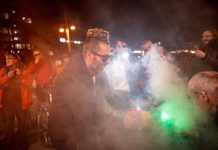Photo: Screenshot from the video
Bakhmut is an Ukrainain city and it cannot be liberated from the Russians as claimed by the post. Russia attacked Bakhmut and destroyed it completely. The fact that Russia claims that this city is Russian is far from reality. According to Kyiv, parts of Bakhmut are still under the control of Ukraine, writes Truthmeter.mk.
Under the content-sharing agreement between Truthmeter.mk and Meta.mk, we republish the text below:
Post on Facebook (screenshot here) shares a video showing soldiers waving a Russian flag and under the video the caption says:
And the last house in Bakhmut liberated by the Russians…
Such a claim is manipulative and its purpose is to allude followers of social networks.
Bakhmut is a city in Ukraine which has been under strong Russian attack for months. It is not the first time for Russia to fight Ukraine for Bakhmut. The same was the case during the war in Donbas in 2014-2015.
On the 12th April 2014, Bakhmut was occupied by pro-Russian separatists of the self proclaimed DPR. 20th June 2014, a large tank-repair base located in Bakhmut was attacked by separatists (the base was attacked a total of five times).
On the 6th July 2014, Ukrainian troops liberated the city.
On the 13th February 2015, one of the regions in Bakhmut was shelled by DPR. The blow destroyed 32 residential buildings, two people were killed and six persons were injured.
On the 10th July 2015, in accordance with the Ukrainian Law on Decommunization, the monument of the founder of the Soviet Republic of Donetsk – Krivoy Rog, Fyodor Andreevic Sergeev (known by his party-name Artyom) was dismantled.
On the 23rd September 2015, the City Council adopted a decision to restore the name of the city as Bakhmut. Verkhovna Rada of Ukraine approved the renaming decision on 4th February 2016.
Bakhmut is again a target of Russian aggression after the President of Russia, Vladimir Putin, attacked Ukraine in February last year.
The nine-month battle for Bakhmut destroyed the 400-year old city in Eastern Ukraine and killed tens of thousands of people.
The city on the North-East side of the region Donetsk had approximately 70.000 inhabitants before Russia attacked Ukraine last year. Since then its population decreased ten times as a result of the most fierce battle in this war because Russian troops and “Wagner” mercenaries – consisting mainly of Russian prisoners – were conquering it block by block.
Last Saturday “Wagner’s” founder, Yevgeny Prigozhin, claimed that his troops finally conquered the whole city, while Kremlin published a statement by the Russian President, Vladimir Putin, boasting about the liberation of the city, calling it by the Soviet-Russian name Artyomovsk.
Ukraine rejected their statement. Kyiv claims that parts of Bakhmut are still under the control of Ukraine.
Bakhmut is an Ukrainian city and as such it cannot be liberated by the Russians, as claimed in the post we are fact-checking. The fact that Russia claims that this city is Russian is far from reality. Russia attacked Bajhmut and destroyed it completely, not saving it from anything, nor did Ukraine ask for such a thing from Russia.
Therefore, the post we are fact-checking is manipulative and we assess it as untrue.




















![Young people in a three-day-workshop learned about data visualization [Gallery]](https://meta.mk/wp-content/uploads/2023/12/obuka-za-vizuelizacija-na-podatoci-vo-dekemvri-2023--100x70.jpg)




